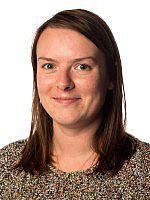 Rosanna Barnard (@BarnardResearch), University of Sussex, will be taking part in Soapbox Science Brighton on 1st June with the talk: “Networks: how mathematical graphs can protect us from epidemics”
Rosanna Barnard (@BarnardResearch), University of Sussex, will be taking part in Soapbox Science Brighton on 1st June with the talk: “Networks: how mathematical graphs can protect us from epidemics”
SS: What attracted you to Soapbox Science in the first place – and what are you
most looking forward to/excited about in taking part?
I think it’s important that academic research is accessible to members of the public. I
was also attracted to Soapbox Science because I am passionate about promoting
women in science, as well as encouraging the researchers of the future.
I spend a lot of time working on a computer in an office, so I am really looking forward
to being outdoors and seeing how people from outside academia react to the work I
am doing!
SS: Tell us about your career pathway
I never ‘knew’ what I wanted to do – other than enjoying my day-to-day work and
working for MI5 (something which I have not yet pursued!)
At school I enjoyed a mix of subjects including the Sciences, Languages and Arts.
For my A Levels I studied Mathematics, English and Photography. I had a really
inspiring Maths teacher during my A Levels, and she encouraged me to study
Mathematics at University. Towards the end of my degree I saw an advert for a PhD
research project which sounded interesting and challenging, and decided to give it a
go (even though I was afraid!). I really enjoyed doing research, and following my
PhD I accepted a position working full-time as a Research Fellow. Now, I get to use
all of the skills and training I have acquired along the way to try and make useful
predictions that help people.
SS: What, or who, inspired you to get a career in science?
I get inspired by people I meet who are really passionate about what they do –
teachers, colleagues, friends and mentors. I also find inspiration in seeing successful
women who are able to `have it all` — balancing their dream career with other
responsibilities such as having a family.
SS: What is the most fascinating aspect of your research/work?
Having recently moved from a Mathematics department to a Biology department, I find
the work that other people are doing around me, on subjects that I am less familiar
with, the most fascinating! I also feel lucky to be doing research that could benefit
humanity as a whole.
SS: Research in STEM is increasingly multi-disciplinary. Which subjects do you
use in your work?
My work utilises techniques from Mathematics, Physics, Epidemiology, Biology and
Public Health.
SS: What 3 attributes do you consider important to your work (e.g. creativity, teamwork,
etc), and why did you pick these?
1. Perseverance
2. Creative thinking / problem solving
3. Kindness
In my experience as a researcher, I have found it to be really important to keep trying
different approaches when things are going wrong. I am also a strong believer in
maintaining a healthy balance between work and things outside of work, and
practicing kindness towards yourself and others.
SS: If you could change one thing about the scientific culture right now, what would
it be?
I want to make scientific research more open and more inclusive. For example, by
making publications and related data publicly available and by encouraging a more
well-mixed academic population by fostering inter-disciplinary collaborations as well
as collaborations between people outside of academia, early career researchers and
established academics.
SS: What would be your top recommendation to a female student considering
pursuing a career in academia?
Absorb as much information as possible! Try different things out: what kind of work do
you like doing? what activities do you like doing outside of work? what sort of working
environment suits you?
Think about developing a dual-path career plan (e.g. have a plan for academia, and a
plan for outside academia)
Attend as many events, lectures, workshops and talks as possible and ask the people
that inspire you what their experiences are and what advice they would give. Enjoy
yourself 🙂
SS: What words of encouragement would you give to children who might be
interested in a career in science?
We need you! You are important and you are unique. You are the researchers of the
future.
